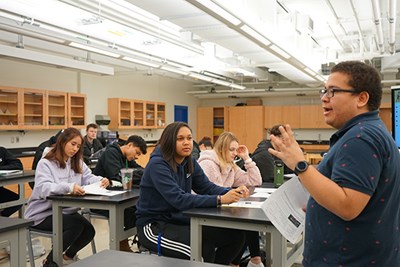
Whenever the chair of the Science Department at Lowell High School has an opening for a teacher, she calls up t
Roger J. Davis, PhD, FRS, and the Cryo-EM Core facility at UMass Medical School have received $2.8 million from the Massachusetts Life Sciences Center (MLSC) for the purchase of an advanced Glacios cryo-electron microscope from Thermo Fisher Scientific. The MLSC is an economic development investment agency dedicated to supporting the growth and development of the life sciences in Massachusetts.
Before the foundation is poured or the first piece of structural steel is set for the new education and research building on the UMass Medical School Worcester campus, work has begun on a geothermal heating and cooling system that will reduce greenhouse gas emissions from the building by 55 percent compared to serving its HVAC needs exclusively with the campus power plant.
The new executive vice chancellor for MassBiologics, Mireli Fino, MBA, said she was drawn to the organization because of its unique mission to both educate the future biotech workforce and have an impact on global health.
A division of UMass Medical School, MassBiologics is the nation’s only nonprofit FDA-licensed manufacturer of vaccines and biologics.
Researchers from UMass Medical School’s Department of Population & Quantitative Health Sciences are working to develop and test mobile technology involving peer messaging and coaching to help adolescents quit using e-cigarettes.
A longitudinal study co-authored by UMass Medical School researchers as part of the National Institutes of Health’s Rapid Acceleration of Diagnostics (RADx) initiative reported that PCR testing for SARS-CoV-2 and rapid antigen testing were equally effective in detecting infection when tests were given at least twice per week.
UMass Medical School is participating in the ACTIV-2 Outpatient Monoclonal Antibodies and Other Therapies Trial, which is being led by the AIDS Clinical Trials Group (ACTG). ACTIV-2 includes both Phase II and Phase III evaluations of investigational agents for treating early COVID-19.
The Dan and Diane Riccio Fund for Neuroscience has awarded four teams of UMass Medical School researchers $50,000 seed grants for interdisciplinary collaborations leading to innovative discoveries that deepen understanding of normal brain function and what goes awry in neurological diseases.
Sally Linowski, associate dean of students, off campus student life and community engagement, has been appointed to the board of directors for the International Town Gown & Association (ITGA).

The International Town & Gown Association is the premier resource for addressing challenges, emerging issues and opportunities between and amongst institutions of higher education and the communities in which they reside.
AMHERST, Mass. – Neuroscientists at the University of Massachusetts Amherst have demonstrated in new research that dopamine plays a key role in how songbirds learn complex new sounds.